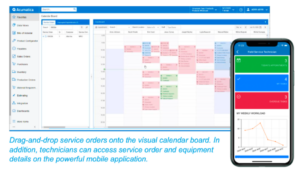How an ERP System Empowers Professional Service Firms with Effective Project Management and Resource Allocation
Professional Service Firms are organizations primarily offering knowledge-based services to their clients. These include entities like law firms, consulting agencies, marketing firms, and architectural practices, among others. They rely heavily on the expertise and skills of their professionals to deliver customized, often complex, services tailored to each client’s unique needs. Unlike product-based businesses, their primary assets are their people and the intellectual capital they hold.
However, managing these assets effectively can be challenging. Professional Service Firms must ensure optimal utilization of their workforce, manage client projects efficiently, and maintain profitability, all while delivering exceptional quality. This balancing act requires a robust system that can handle complex data, provide insights, and streamline operations, which leads us to the challenges these firms face.
Challenges Faced by Professional Service Firms
Professional Service Firms navigate a maze of challenges in their daily operations. Firstly, the nature of providing customized services means that no two projects are the same, which complicates project management and resource allocation. They also face intense pressure to ensure consultant hours are tracked and billed accordingly, maintaining profitability while delivering value to their clients. Furthermore, as the business landscape becomes more competitive and clients demand more transparency and faster service, these firms must constantly innovate and improve their processes.
The lack of integrated systems can lead to disjointed operations, data silos, and inefficiencies. This not only affects the bottom line but can also lead to decreased client satisfaction. For these firms, having a system that provides a holistic view of the business, optimizes resource use, and improves decision-making is not just beneficial; it’s critical.
7 Ways an ERP Solution Helps Service Businesses Succeed
Modern ERP solutions provide the necessary tools to manage the complex operations of businesses in the Professional Services industry. As a result, such companies consistently see improvements in every aspect of their daily operations. Here are a few to consider:
1. Project Scheduling and Planning
-
- Feature: ERP systems offer sophisticated tools for project scheduling and planning, including Gantt charts, task lists, and milestone tracking. These tools allow for the detailed breakdown of projects into phases, tasks, and subtasks, assigning them to team members with deadlines and dependencies.
-
- Benefit: This enables service businesses to outline the entire project lifecycle clearly, ensuring everyone understands their responsibilities and deadlines. It helps in preventing bottlenecks and ensures a smoother workflow, leading to timely project completion and higher client satisfaction.
2. Resource Management
-
- Feature: This includes tools for allocating and scheduling your most valuable resources: people. It provides an overview of assigned workloads, schedule availability, expertise, and the cost associated with each consultant.
-
- Benefit: Effective resource management ensures that the right consultants are available at the right time and are being utilized efficiently, yet without overworking them and causing burnout. This leads to optimized costs, maximized billable hours, and the ability to handle multiple projects simultaneously without over or underutilization of human capital.

3. Time and Expense Tracking
-
- Feature: ERP systems allow for the accurate tracking of time and expenses related to each project. Employees can log their time spent on tasks, and expenses can be recorded as they occur.
-
- Benefit: This provides real-time insight into the cost of a project, helping service businesses monitor budgets closely and bill clients accurately. It also aids in identifying areas where costs may overrun, allowing corrective actions to be taken promptly.
4. Billing and Invoicing
-
- Feature: Integrated billing and invoicing capabilities ensure that billing is based on the actual work done and expenses incurred. The system can support various billing methods, including fixed price, by the hour, and milestone billing.
-
- Benefit: This streamlines the invoicing process, reduces errors, and ensures timely and accurate billing. It improves cash flow management and customer satisfaction by providing clients with clear, detailed invoices.
5. Collaboration Tools
-
- Feature: Many ERP systems include tools for document sharing, communication, and collaboration among project team members and with clients.
-
- Benefit: These tools facilitate better teamwork and communication, ensuring that everyone is on the same page and can access the information they need. This leads to faster decision-making and problem-solving, enhancing the overall efficiency of the project.
6. Reporting and Analytics
-
- Feature: Advanced reporting and analytics provide deep insights into various aspects of the project, such as performance metrics, profitability, and consultant assignments.
-
- Benefit: These insights enable service businesses to make informed decisions based on data, continually improve their processes, and demonstrate their value to clients with transparent, detailed reports.
7. Compliance Management
-
- Feature: Compliance management tools ensure that projects adhere to industry standards, legal requirements, and internal policies.
-
- Benefit: This reduces the risk of non-compliance penalties and helps maintain the firm’s reputation. It also ensures that the final deliverables meet the required standards and client expectations.
Take the Next Step to Improve Operations in Your Professional Services Firm
 For Professional Service firms, having a robust ERP system is not just an advantage; it’s a necessity. Solutions like Acumatica and Microsoft Dynamics 365 Business Central provide the tools and insights needed to manage projects effectively, allocate resources efficiently, and maintain a competitive edge. By streamlining operations, enhancing decision-making, and improving client service, ERP systems empower firms to focus on what they do best – delivering exceptional service.
For Professional Service firms, having a robust ERP system is not just an advantage; it’s a necessity. Solutions like Acumatica and Microsoft Dynamics 365 Business Central provide the tools and insights needed to manage projects effectively, allocate resources efficiently, and maintain a competitive edge. By streamlining operations, enhancing decision-making, and improving client service, ERP systems empower firms to focus on what they do best – delivering exceptional service.
If you’re looking to transform your Professional Service firm with an effective ERP solution, contact Gale Force Consulting today. Discover how modern, cloud-based applications can drive success and innovation in your business. Don’t just keep up with the competition; set the standard for excellence in your industry.


